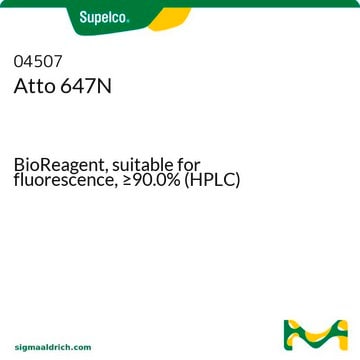92835
Atto 550 NHS ester
BioReagent, suitable for fluorescence
About This Item
Recommended Products
product line
BioReagent
Quality Level
Assay
≥90.0% (HPLC)
≥90.0% (degree of coupling)
form
powder
manufacturer/tradename
ATTO-TEC GmbH
λ
in ethanol (with 0.1% trifluoroacetic acid)
UV absorption
λ: 553.0-559.0 nm Amax
suitability
suitable for fluorescence
storage temp.
−20°C
Application
related product
Storage Class Code
11 - Combustible Solids
WGK
WGK 3
Personal Protective Equipment
Certificates of Analysis (COA)
Search for Certificates of Analysis (COA) by entering the products Lot/Batch Number. Lot and Batch Numbers can be found on a product’s label following the words ‘Lot’ or ‘Batch’.
Already Own This Product?
Find documentation for the products that you have recently purchased in the Document Library.
Customers Also Viewed
Articles
Chromogenic and fluorogenic derivatives are invaluable tools for biochemistry, having numerous applications in enzymology, protein chemistry, immunology and histochemistry.
Our team of scientists has experience in all areas of research including Life Science, Material Science, Chemical Synthesis, Chromatography, Analytical and many others.
Contact Technical Service








